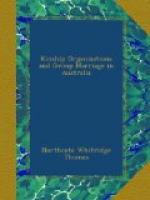In estimating the value of the custom of jus primae noctis as evidence of a prior state of group marriage, a custom of the Yuin should not be overlooked. If a man elopes with another man’s betrothed he is punished by having to fight the girl’s father, brothers, and mother’s brother; the girl was sometimes punished by being beaten; all the men who pursued her had a right of access provided they were of the right totem and locality. If however the eloping couple were not caught they were not liable to punishment after a child was born. There is no mention of any jus primae noctis where the marriage was the result of betrothal. In this case therefore the right of access is a punishment, so far as the girl is concerned; it is earned by taking part in the pursuit, a fact which confirms the suggested explanation of the right of access at marriage.
It should not be overlooked that this form of punishment is found among some tribes as the penalty for adultery[194], when it certainly cannot be interpreted as an expiation for individual marriage. This was the case among the Wotjoballuk, the Kamilaroi, and the Euahlayi.
We may now turn to the customs of the central and northern tribes visited by Messrs Spencer and Gillen. Except in the case of three of the north-eastern tribes the right of access accrues in connection with the ariltha ceremony. It may be said at once that there is among these tribes no trace of access as payment for services; for on the rare occasions when a wife is captured she is allotted to an individual and becomes his property at once, according to a statement in the first work of Spencer and Gillen[195]. In the same work, it is true, this statement is contradicted by the assertion that on such occasions only the men of the right class are allowed to have access[196]. But this statement does not seem to be based on any facts within the knowledge of the writers, for they make a definite statement to the contrary with regard to the Arunta customs, and it was with the Arunta that they were specially concerned, and in the later volume no further details are given, as they should have been, if the custom was found among any of the tribes visited on the second expedition.
The association of the right of access with the initiation ceremony is paralleled, as we have already seen, among other tribes. It hardly seems necessary to argue a state of primitive promiscuity from a custom of licence at the period of puberty, which does not in fact differ, except in degree, from the licence normally enjoyed by the unmarried, and is readily explicable on other grounds than those suggested by Spencer and Gillen. If we are not prepared to regard this licence at puberty, which may equally well have subsisted side by side with marriage or group promiscuity, as a mere expression of the newly attained sexual rights, we have as an alternative the magical theory of Mr Crawley. I do not propose to dwell on this but will pass at once to discuss some points which seem to have escaped the notice of Spencer and Gillen when they proposed their hypothesis of promiscuity.




